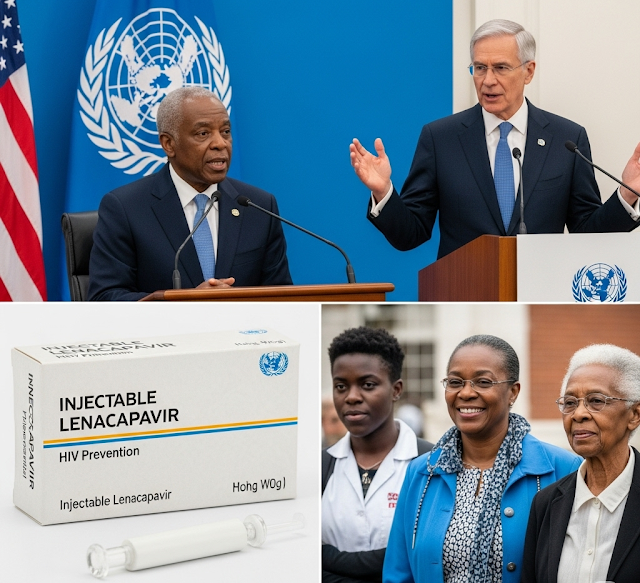On July 14, 2025, the World Health Organization (WHO) announced a significant new recommendation that could transform global HIV prevention efforts: the use of injectable lenacapavir (LEN) twice a year as an additional option for pre-exposure prophylaxis (PrEP). This landmark policy action was unveiled at the 13th International AIDS Society Conference (IAS 2025) on HIV Science in Kigali, Rwanda.
Lenacapavir: A Game-Changer for HIV Prevention
LEN is the first twice-yearly injectable PrEP product, offering a highly effective and long-acting alternative to daily oral pills and other shorter-acting options. With just two doses annually, LEN represents a major leap forward in protecting individuals at risk of HIV, especially those who face challenges with daily adherence, stigma, or access to healthcare.
Dr. Tedros Adhanom Ghebreyesus, WHO Director-General, highlighted the importance of this development, stating, "While an HIV vaccine remains elusive, lenacapavir is the next best thing: a long-acting antiretroviral shown in trials to prevent almost all HIV infections among those at risk." He emphasized that the new WHO guidelines, coupled with recent FDA approval, are crucial steps in expanding access to this powerful tool.
Addressing Stagnation in HIV Prevention
This new guideline comes at a critical time when HIV prevention efforts have stalled, with 1.3 million new HIV infections occurring in 2024. This disproportionately impacts key and priority populations, including sex workers, men who have sex with men, transgender people, people who inject drugs, people in prisons, and children and adolescents. WHO's recommendation for LEN signals a decisive move to diversify HIV prevention options, empowering individuals to take control of their health with choices that better fit their lives.
Simplified Testing: Removing a Major Barrier
A key component of these new guidelines is WHO's recommendation for a public health approach to HIV testing using rapid tests. This streamlined testing process supports the delivery of long-acting injectable PrEP, including both LEN and cabotegravir (CAB-LA). By eliminating complex and costly procedures, this simplified testing removes a major access barrier and enables community-based delivery of long-acting PrEP through various channels like pharmacies, clinics, and telehealth services.
Call for Immediate Implementation
LEN joins other WHO-recommended PrEP options, such as daily oral PrEP, injectable cabotegravir, and the dapivirine vaginal ring, expanding the arsenal of tools available to end the HIV epidemic. While access to LEN outside of clinical trials is currently limited, WHO strongly urges governments, donors, and global health partners to immediately begin rolling out LEN within national combination HIV prevention programs. This rollout should be accompanied by the collection of essential data on uptake, adherence, and real-world impact.
Additional WHO Recommendations at IAS 2025
Beyond LEN, WHO also released several other important recommendations at IAS 2025:
Long-Acting Injectable ART: For the first time, WHO's treatment guidelines include a clear recommendation for long-acting injectable cabotegravir and rilpivirine (CAB/RPV) as an alternative switching option for antiretroviral therapy (ART). This is for adults and adolescents who have achieved full viral suppression on oral ART and do not have active hepatitis B infection. This approach aims to support people living with HIV who face adherence challenges with oral regimens.
Integrated Service Delivery: Updated guidelines on service delivery integration recommend combining HIV services with care for noncommunicable diseases (NCDs) like hypertension and diabetes, as well as mental health care for depression, anxiety, and alcohol use disorders. New guidelines on management of asymptomatic STIs also recommend screening for gonorrhea and/or chlamydia in key and priority populations.
Mpox and HIV: For people living with HIV who have mpox and are either ART naive or have experienced prolonged ART interruption, rapid initiation of ART is strongly recommended. Early HIV testing is also advised for individuals with suspected or confirmed mpox infection, and WHO's standard operating procedures emphasize HIV and syphilis testing for all individuals with suspected or confirmed mpox.
Sustaining HIV Services: In response to broader challenges facing HIV programs, WHO has issued new operational guidance on sustaining priority HIV services in a changing funding landscape. This guidance provides a framework for countries to prioritize services, assess risks, monitor disruptions, and adapt systems to protect health outcomes.
Dr. Meg Doherty, Director of WHO’s Department of Global HIV, Hepatitis and STI Programmes, emphasized, "We have the tools and the knowledge to end AIDS as a public health problem. What we need now is bold implementation of these recommendations, grounded in equity and powered by communities."
With an estimated 40.8 million people living with HIV by the end of 2024 and 1.3 million new infections annually, these new and updated guidelines from WHO offer practical, evidence-based strategies to maintain momentum. By expanding prevention and treatment options, simplifying service delivery, and promoting integration with broader health services, they aim to support more efficient, equitable, and resilient HIV responses. The time for bold implementation is now to ensure these advancements translate into real-world impact.








0 Comments